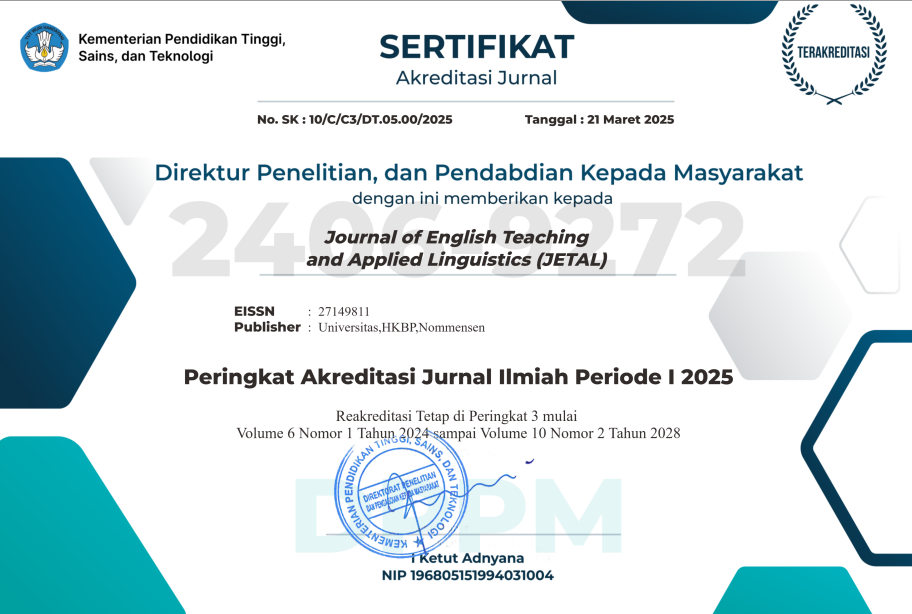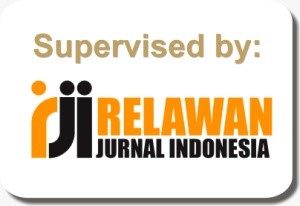Exploring Student Experiences in E-Learning for English Literacy: Voices from an Indonesian Higher Education Context
Abstract
This qualitative case study explored students' experiences and responses towards the implementation of e-learning in English literacy classes at Universitas Sulawesi Barat, Indonesia. The study employed a purposive sampling method, involving 145 students enrolled in reading and writing courses during the 2022/2023 academic year. Data were collected through reflection essays addressing 30 questions, validated by subject matter experts, and analyzed using thematic analysis. The findings revealed several key themes, including challenges faced by students such as internet connectivity issues and initial difficulties navigating e-learning systems. While e-learning facilitated ubiquitous learning, concerns were raised regarding engagement levels, social connectedness, and comprehension compared to face-to-face interactions. Students valued the flexibility and accessibility of e-learning resources but emphasized the need for relevant, reliable, and interactive materials. The study underscored the valuable role of technology in enhancing e-learning quality through expansive content access, interactive features, and flexibility. However, digital literacy gaps and suitability concerns for certain skills were identified as limitations. Overall, a balanced blended learning approach integrating e-learning with traditional face-to-face elements was recommended to optimize learning outcomes in English literacy education. The findings inform pedagogical practices, institutional strategies, and future research on leveraging educational technology to enhance English literacy instruction effectively.
References
Alhumsi, M. H., Alshaye, R. A., & Sendi, K. K. (2021). The Effect of E-Learning Sessions on the Development of Reading Comprehension: A Case of EFL Students Perceptions at Saudi Electronic University. Journal of Education and E-Learning Research, 8(4), 431–439. https://doi.org/10.20448/journal.509.2021.84.431.439
Almaiah, M. A., Al-Khasawneh, A., & Althunibat, A. (2020). Exploring the Critical Challenges and Factors Influencing the E-Learning System Usage During COVID-19 Pandemic. Education and Information Technologies. https://doi.org/10.1007/s10639-020-10219-y
Alobaid, A. (2020). Smart multimedia learning of ICT: role and impact on language learners’ writing fluency-YouTube online English learning resources as an example. Smart Learning Environments, 7(1), 24. https://doi.org/10.1186/s40561-020-00134-7
Bai, B., Wang, J., & Zhou, H. (2022). An intervention study to improve primary school students’ self-regulated strategy use in English writing through e-learning in Hong Kong. Computer Assisted Language Learning, 35(9), 2265–2290. https://doi.org/10.1080/09588221.2020.1871030
Braun, V., & Clarke, V. (2006). Using thematic analysis in psychology. Qualitative Research in Psychology, 3(2), 77–101. https://doi.org/10.1191/1478088706qp063oa
Buhl-Wiggers, J., Kjærgaard, A., & Munk, K. (2023). A scoping review of experimental evidence on face-to-face components of blended learning in higher education. Studies in Higher Education, 48(1), 151–173. https://doi.org/10.1080/03075079.2022.2123911
Buragohain, D., Punpeng, G., Jaratjarungkiat, S., & Chaudhary, S. (2023). Impact of E-Learning Activities on English as a Second Language Proficiency among Engineering Cohorts of Malaysian Higher Education: A 7-Month Longitudinal Study. In Informatics (Vol. 10, Issue 1). https://doi.org/10.3390/informatics10010031
Chen, T., Peng, L., Jing, B., Wu, C., Yang, J., & Cong, G. (2020). The Impact of the COVID-19 Pandemic on User Experience with Online Education Platforms in China. In Sustainability (Vol. 12, Issue 18). https://doi.org/10.3390/su12187329
Creswell, J. W., & Creswell, J. D. (2017). Research design: Qualitative, quantitative, and mixed methods approaches. Sage publications.
Dai, Y. (2021). The Impact of Genre-Based Pedagogy on Students’ Reading Ability and Critical Thinking Quality Development in Content and Language Integrated Learning. 23, 200–204. https://doi.org/10.23977/ELEPS2021050
Dumiyati, D., Husnita, L., Nazmi, R., Safar, M., & Suharyat, Y. (2024). Implementation of E-Learning Technology in Encouraging Independent and Flexible Learning. At-Tasyrih: Jurnal Pendidikan Dan Hukum Islam, 10(1), 158–169.
Elekaei, A., Tabrizi, H. H., & Chalak, A. (2020). Evaluating learners’ vocabulary gain and retention in an e-learning context using vocabulary podcasting tasks: A case study. Turkish Online Journal of Distance Education, 21(2), 190–203. https://doi.org/10.17718/TOJDE.728162
Fageeh, A. I. (2024). Maximizing learning management systems in online college English education: Views from France and Saudi Arabia. Social Sciences & Humanities Open, 9, 100868. https://doi.org/https://doi.org/10.1016/j.ssaho.2024.100868
Fernández-Fontecha, A., O’Halloran, K. L., Wignell, P., & Tan, S. (2020). Scaffolding CLIL in the science classroom via visual thinking: A systemic functional multimodal approach. Linguistics and Education, 55, 100788. https://doi.org/https://doi.org/10.1016/j.linged.2019.100788
Fülöp, M. T., Breaz, T. O., Topor, I. D., Ionescu, C. A., & Dragolea, L. L. (2023). Challenges and perceptions of e-learning for educational sustainability in the “new normality era.” Frontiers in Psychology, 14(January), 1–14. https://doi.org/10.3389/fpsyg.2023.1104633
Gao, L. (2023). Contemporary american literature in Online Learning: fostering Reading Motivation and Student Engagement. Education and Information Technologies, 28(4), 4725–4740. https://doi.org/10.1007/s10639-022-11329-5
Hiromori, T. (2024). Group work dynamics and the role of leadership in face-to-face and online second language classes. International Journal of Applied Linguistics, 34(1), 316–332. https://doi.org/https://doi.org/10.1111/ijal.12495
Ingavélez-Guerra, P., Otón-Tortosa, S., Hilera-González, J., & Sánchez-Gordón, M. (2023). The use of accessibility metadata in e-learning environments: a systematic literature review. Universal Access in the Information Society, 22(2), 445–461. https://doi.org/10.1007/s10209-021-00851-x
Isma, A. (2023). Enhancing digital literacies with adult English language learners: Theoretical and practical insights. TESOL Journal. https://doi.org/10.1002/tesj.752
Isma, A., Basri, M., Abduh, A., Putri, A. M. J., & Hustiana, H. (2024). Empowering E-Learning for English Literacy Development: Insights from Lecturers. JETAL: Journal of English Teaching and Applied Linguistics, 5(2), 146–153. https://doi.org/10.36655/jetal.v5i2.1495
Isma, A., Hermansyah, S., Ramadhani, Y. R., Lestari, I. W., Evenddy, S. S., Talenta, P. I., Sastri, L., Rasmin, L. O., Febrianto, A. R., & Pavita, M. D. A. (2023). Teaching English to 21st Century Learners (1st ed.). Yayasan Kita Menulis.
Isma, A., Lestari, I. W., Rohimajaya, N. A., Hardiyanto, A., Susanti, E., Meisarah, F., Novia, S., Kuning, D. S., Hamer, W., & Rasmin, L. O. (2024). Digital Tools for English Language Learning: A Comprehensive Guide for EFL Educators (1st ed.). Yayasan Kita Menulis.
Isma, A., Sudewi, P. W., & Amrang, A. (2024). Exploring the Attitudes of English Language Learners toward Online Learning in Indonesian Higher Education. The Journal of Asia TEFL, 21(1), 207–216. https://doi.org/10.18823/asiatefl.2024.21.1.13.207
Li, X., Xia, Q., Chu, S. K., & Yang, Y. (2022). Using Gamification to Facilitate Students’ Self-Regulation in E-Learning: A Case Study on Students’ L2 English Learning. In Sustainability (Vol. 14, Issue 12). https://doi.org/10.3390/su14127008
Malkawi, N., Rababah, M., Al Dalaeen, I., Ta’amneh, I., El Omari, A., Alkhaldi, A. A., & Rabab’ah, K. (2023). Impediments of Using E-Learning Platforms for Teaching English: A Case Study in Jordan. International Journal of Emerging Technologies in Learning, 18(5), 95–113. https://doi.org/10.3991/ijet.v18i05.36727
Martyushev, N., Shutaleva, A., Malushko, E., Nikonova, Z., & Savchenko, I. (2021). Online Communication Tools in Teaching Foreign Languages for Education Sustainability. In Sustainability (Vol. 13, Issue 19). https://doi.org/10.3390/su131911127
Moosavi, Z., & DeWitt, D. (2023). Online Distance Learners’ Perceptions and Needs for Personalized Learning in English as a Foreign Language Courses. MOJES: Malaysian Online Journal of Educational Sciences, 11(2), 37–49. http://mojes.um.edu.my/index.php/MOJES/article/view/43071%0Ahttp://mojes.um.edu.my/index.php/MOJES/article/download/43071/15596
Nabhan, S. (2021). Conceptions of Literacy in English Language Education Context. Proceedings of the 2nd Annual Conference on Social Science and Humanities (ANCOSH 2020), 542(Ancosh 2020), 203–206. https://doi.org/10.2991/assehr.k.210413.047
Ndibalema, P. (2022). Constraints of transition to online distance learning in Higher Education Institutions during COVID-19 in developing countries: A systematic review. E-Learning and Digital Media, 19(6), 595–618. https://doi.org/10.1177/20427530221107510
Nikou, S., & Maslov, I. (2023). Finnish university students’ satisfaction with e-learning outcomes during the COVID-19 pandemic. International Journal of Educational Management, 37(1), 1–21. https://doi.org/10.1108/IJEM-04-2022-0166
Palinkas, L. A., Horwitz, S. M., Green, C. A., Wisdom, J. P., Duan, N., & Hoagwood, K. (2015). Purposeful Sampling for Qualitative Data Collection and Analysis in Mixed Method Implementation Research. Administration and Policy in Mental Health and Mental Health Services Research, 42(5), 533–544. https://doi.org/10.1007/s10488-013-0528-y
Patra, I., Hashim Alghazali, T. A., Sokolova, E. G., Prasad, K. D. V., Pallathadka, H., Hussein, R. A., Shanan, A. J., & Ghaneiarani, S. (2022). Scrutinizing the Effects of e-Learning on Enhancing EFL Learners’ Reading Comprehension and Reading Motivation. Education Research International, 2022. https://doi.org/10.1155/2022/4481453
Poon, W. C., Kunchamboo, V., & Koay, K. Y. (2024). E-Learning Engagement and Effectiveness during the COVID-19 Pandemic: The Interaction Model. International Journal of Human–Computer Interaction, 40(2), 393–408. https://doi.org/10.1080/10447318.2022.2119659
Rajabalee, Y. B., & Santally, M. I. (2021). Learner satisfaction, engagement and performances in an online module: Implications for institutional e-learning policy. Education and Information Technologies, 26(3), 2623–2656. https://doi.org/10.1007/s10639-020-10375-1
Shalaby, Y. M. A., & El-Kasaby, W. H. (2024). Modeling the Causal Relations between Mind Wandering , Digital Readiness and Academic Engagement in E-Learning among University Students. Kurdish Studies, 12(2), 529–539. https://doi.org/10.58262/ks.v12i2.041
Tong, D. H., Uyen, B. P., & Ngan, L. K. (2022). The effectiveness of blended learning on students’ academic achievement, self-study skills and learning attitudes: A quasi-experiment study in teaching the conventions for coordinates in the plane. Heliyon, 8(12), e12657. https://doi.org/10.1016/j.heliyon.2022.e12657
Wang, Y. (2023). Enhancing English reading skills and self-regulated learning through online collaborative flipped classroom: a comparative study. Frontiers in Psychology, 14. https://www.frontiersin.org/journals/psychology/articles/10.3389/fpsyg.2023.1255389
Yin, R. K. (2018). Case study research and applications: Design and methods. SAGE Publication, Inc. https://doi.org/10.1177/109634809702100108
Yılmaz, F. G. K., & Yılmaz, R. (2023). Exploring the role of sociability, sense of community and course satisfaction on students’ engagement in flipped classroom supported by facebook groups. Journal of Computers in Education, 10(1), 135–162. https://doi.org/10.1007/s40692-022-00226-y
Zambrano, M., Ruiz, J., Villacís, C., Pérez, D., Carvajal, V., & Guijarro, J. (2020). Online Course of Reading-Writing and Multimedia Application with Virtual Assistants for Schools. 2020 15th Iberian Conference on Information Systems and Technologies (CISTI), 1–6. https://doi.org/10.23919/CISTI49556.2020.9141040
Zengilowski, A., Lee, J., Gaines, R. E., Park, H., Choi, E., & Schallert, D. L. (2023). The collective classroom “we”: The role of students’ sense of belonging on their affective, cognitive, and discourse experiences of online and face-to-face discussions. Linguistics and Education, 73, 101142. https://doi.org/https://doi.org/10.1016/j.linged.2022.101142

This work is licensed under a Creative Commons Attribution-ShareAlike 4.0 International License.
Authors retain copyright and grant the journal right of first publication with the work simultaneously licensed under a Creative Commons Attribution-ShareAlike 4.0 International License (CC BY-SA 4.0) that allows others to share the work with an acknowledgment of the work's authorship and initial publication in this journal.
Authors are able to enter into separate, additional contractual arrangements for the non-exclusive distribution of the journal's published version of the work (e.g., post it to an institutional repository or publish it in a book), with an acknowledgment of its initial publication in this journal.
Authors are permitted and encouraged to post their work online (e.g., in institutional repositories or on their website) prior to and during the submission process, as it can lead to productive exchanges, as well as earlier and greater citation of published work (See The Effect of Open Access).






